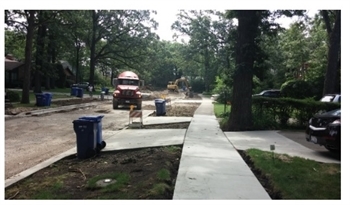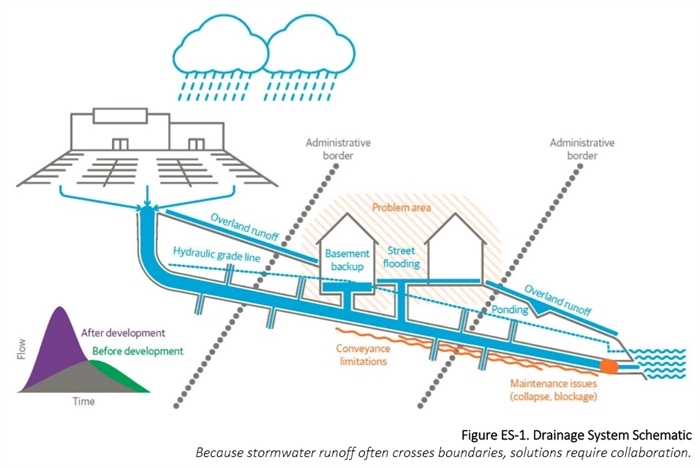
Like a well orchestrated crew, all of us will have to play our part in solving urban flooding.
Let's stop basement flooding.
It’s an easy enough sentence to type, but the strategy to achieve it is not.
One of the main challenges is that rainwater doesn't respect human-made boundaries. Following the path of least resistance, it flows according to the laws of gravity (downward), which often crosses many arbitrary lines: planning areas, municipal borders, storm sewer pipes and property lines. While water may disregard these boundaries, water resource managers, elected officials and property owners know they matter a great deal.
That is why collaboration is so critical today. Technology alone—be it the latest computer modeling or infrastructure innovation—will not solve our urban flooding woes. To accomplish this feat, we need to establish coordination and cooperation across the lines. And we need to recognize that each of us has a role to play in solving the issue—stormwater management is indeed an all-hands-on-deck situation.
Those were some of the themes that were discussed during the recent Metropolitan Planning Council (MPC) roundtable A Flood of Ideas: Emerging Best Practices in Stormwater Planning that took place on Thursday, Nov. 17, 2016. Sponsored by Christopher B. Burke Engineering, Ltd., the event brought together almost 90 people to learn about and discuss the latest approaches to identifying and solving our region’s urban flooding.
Featured agencies included the Metropolitan Water Reclamation District of Greater Chicago, Chicago Metropolitan Agency for Planning and Center for Neighborhood Technology, all of whom have a suite of programs and resources available to assist local communities with stormwater planning and management challenges.
Two essential elements highlighted during the discussion were 1) the need for dedicated funding and 2) the need for collaboration—be it across municipal, agency or stakeholder boundaries. At the event, MPC released two new resources available to the region to address these needs:
Dedicated revenue for stormwater management:

City of Highland Park, Ill.
Storm sewer upgrade project construction largely funded by the City of Highland Park's stormwater management fee.
Communities in our region face an increasingly wet and rainy climate. Having an adequate and steady stream of revenue to reduce increasing street flooding and basement back-ups, as well as erosion, contamination and degradation of rivers and lakes is an absolute necessity.
MPC has created an online guide to assist community leaders with dedicating dollars to alleviate the costly and devastating impacts of urban flooding for residents and businesses.
Framework for cross-jurisdictional stormwater planning:
In order to coordinate across traditional boundary lines, a framework must exist. MPC and global engineering firm CH2M teamed up to explore what a framework could look like that enables a region to plan and implement stormwater solutions across boundaries.
We believe this is the next wave of innovation in solving flooding and stormwater-related challenges, and this white paper provides a vision—a starting point for discussion on how such a structure could allow for the accumulation and exchange of information, identify shared problems and make mutually beneficial decisions. Many thanks to CH2M for their partnership and expertise in the creation of this first-of-its-kind white paper!

It is MPC’s intention that these two new resources provide a useful roadmap for community leaders on how to lessen—and ultimately alleviate—flooding that ruins property, jeopardizes health and costs us millions.
Urban flooding affects all of us: our family, friends and neighbors. It’s personal. This equalizing effect can be a force for change. Since flooding knows no boundaries, it is up to us to better understand where our human-made boundaries need to better coordinate and collaborate to alleviate flooding’s devastating impacts. So check out the latest, free resources above, and join us in this effort.
MPC thanks Christopher B. Burke Engineering, Ltd. for major sponsorship of our Nov. 17 event.